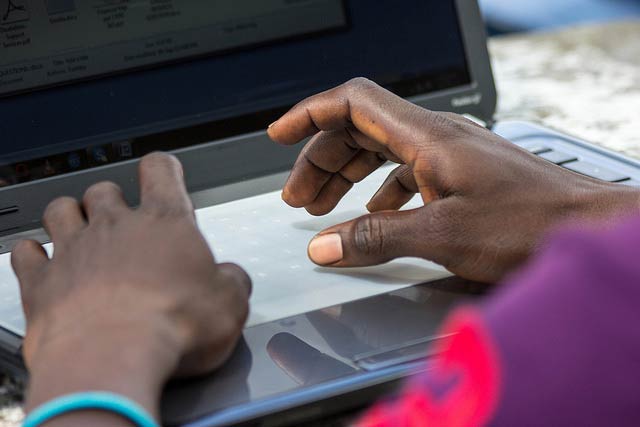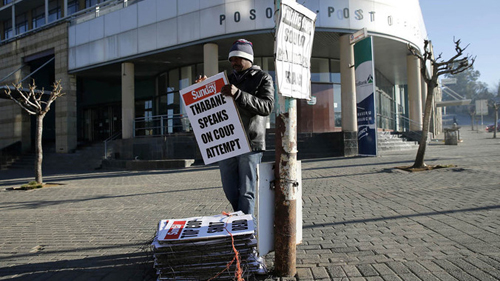
In 2012, nine Ethiopian men and women came together to create a blogging collective known as Zone 9. In an autocratic country rife with political corruption and where state-run media is utterly dominant, this was a bold move.
Writing in both English and Amharic, the bloggers covered some of the country’s most pressing social and economic issues, giving life to stories all but absent from local media.
Zone 9 believed it was imperative to speak publicly about the national constitution, which claims to protect freedom of expression and the right of assembly, and which demands elections every five years. The bloggers thought that if citizens could hold their government accountable through a free press, the country’s civic fabric could become stronger. Citizens could have some say in how the country was run.
On April 25 2014, the writers were taken from their homes and detained by police. After 11 weeks behind bars, they were charged under Ethiopia’s anti-terrorism laws.
Nothing new
Ethiopia currently ranks fourth on a list of the world’s most censored countries, according to a Committee to Protect Journalists report released [last] week.
In the run-up to elections in May, the report found that the government had filed lawsuits accusing six publications of “encouraging terrorism”, forcing 16 journalists to flee into exile, while the sole internet provider, Ethio Telecom, stand accused of routinely suspending critical news websites.
This is nothing new: over the last 24 years the ruling Ethiopian People’s Revolutionary Democratic Front has fine-tuned its social and political control, whilst simultaneously being credited by western governments for transforming the once poverty-stricken country into a rising, dynamic and stable one.
They weren’t the first. A series of Ethiopia’s successive and diametrically opposed regimes – from the military regime under Mengistu Haile Mariam (ousted in 1991) and the imperial rule under Haile Selassie before him – have had one thing in common: all have jailed and killed opposition activists, journalists and dissidents.
The Zone 9 name is in part inspired by this history. Kality, a prison on the outskirts of Addis Ababa, is divided into eight different zones, and it’s the last which has gained infamy – zone eight – home to journalists, human rights activists and dissidents.
Endalk Chala, one of the three Zone 9ers who remains free today, said that when the group formed “we decided to create a blog for the proverbial prison in which all Ethiopians live: this is Zone 9.”
The Ethiopian government accuses the bloggers of attempting to “overthrow, modify or suspend the Federal or State Constitution; by violence, threats, or conspiracy”.
The bloggers are expected to face trial later this year. If convicted, all of them face a minimum of eight years in prison.
Ethiopia is the beneficiary of significant flows of foreign military and humanitarian aid, largely intended to bolster and maintain the country as a security stronghold in the Horn of Africa, where levels of ethnic tension, corruption and crime are high.
With a genuine terror threat emanating from neighbouring Somalia, the government has developed sweeping anti-terrorism laws with the blessing of the international governments. But these laws are frequently used to suppress any hint of dissent within its own population.
From late 2005 until 2012 there were no major public demonstrations from the political opposition. There was also little critique: Ethiopia does not have a single independent daily newspaper, only a handful of state-sanctioned FM radio stations, and one government television station.
After the 2005 national elections, the regime banned opposition groups and labour unions, including religious groups, and imposed state control over their websites.
After the following 2010 election, where the government claimed to have won 99.9% of seats in parliament, the regime took control of all of the country’s major institutions including the courts, the media, mosques, churches, schools and universities. By 2012, the internet became the sole option for public communications and discourse.
‘Freedom of expression is considered immoral’
In 2013 amidst a climate of mounting intimidation and surveillance the Zone 9ers let their blog go quiet for six months.
They were unnerved by the treatment of award-winning journalists such as Eskinder Nega, Reeyot Alemu and Wubeshet Taye who had been, along with nine others, sentenced to between eight and 18 years in prison.
All had written columns criticising the anti-terrorism laws, the very same legislation they were later charged with violating.
But in 2014 the bloggers decided they could not remain quiet any longer. They published a letter explaining their silence.
“Last time we published a piece on our collective blog was about six months ago,” they wrote. “We know that Ethiopia is a country where freedom of expression is effectively repressed … Our rulers consider freedom of expression as something immoral.”
“When we became quiet, we thought we would be at least forgotten.” But they weren’t.
On April 25, just a week after posting the letter on Facebook, six members of the blogging team and three journalists apparently “affiliated” with them were arrested.
One year on they still await trial. The charge sheet accuses the bloggers of having received training in communication encryption in Security-in-a-Box – a digital security toolkit to help human rights groups protect themselves from surveillance, which is widely available online.
It also highlights their efforts in organising social media campaigns to engage more Ethiopians in conversations about human rights and national law.
In a letter about his experiences in prison and his hopes for the future, imprisoned blogger Natnael Feleke recently wrote: “To be honest, how much time I will be spending in prison is not the most pressing issue on my mind right now. Rather, I am worried about what will happen unless the international community assumes a firm stance on Ethiopia, demands progress with democratisation, and halts the millions of dollars pouring the regime’s way.”
“But ultimately,” Feleke writes, ‘it is the willingness to suffer and sacrifice [for our cause]’, in the words of Nelson Mandela, that will determine our fate.”
Ellery Roberts Biddle and Endalk Chala for Global Voices, in collaboration with the Guardian Africa network


